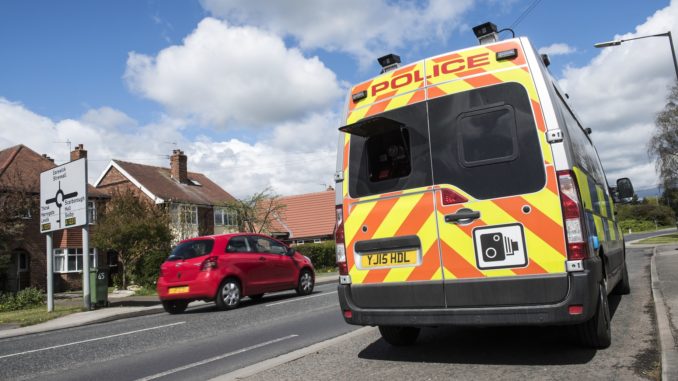
North Yorkshire’s new Police, Fire and Crime Commissioner has announced a review of the county’s controversial and unique mobile speed camera van system as he outlined his priorities ahead of taking up office tomorrow.
Speaking to the media outside the police force’s headquarters in Northallerton, Conservative Philip Allott said he expected to remain “on a rollercoaster getting to grips with the brief” for some months, but added he had already agreed an outline plan with the chief fire and police officers.
Signalling a determination to take his oversight of both emergency services in a different direction to that of his fellow Tory predecessor Julia Mulligan, Mr Allott said there were “big concerns” over camera vans, which have multiplied since they were first introduced in 2011.
Despite the force’s insistence the vans are deployed accident black spots, widespread concerns have persisted for a decade that they are being sited at places to maximise the revenue they generate rather than improve safety.
Mr Allott said: “People say the camera vans are in the wrong locations. People say their village doesn’t get a camera van. People say there are other solutions.”
He declined to elaborate on the concerns, but added: “There will be a rethink in terms of how that is handled and that will be something that involves a consultation process.”
In another apparent change in direction, he said he wanted to strengthen ties with councils and other bodies. He said the commissioner’s office could not work in isolation to tackle issues such as County Lines, which he ranked as his leading priority, or antisocial behaviour.
The commissioner said he would seek to forge closer partnerships with schools to identify children who act as couriers and with social services to identify vulnerable people whose homes may be used as county lines bases.
He said there were now 47 active County Lines networks operating in the county, representing a huge increase on 14 months ago when Mrs Mulligan revealed there were 11 drug supply lines from urban areas such as Cleveland, West Yorkshire, Liverpool and Manchester affecting North Yorkshire.
Mr Allott: “It is a community issue. Unfortunately during the pandemic recreational drugs has seen an increase in some activity. That’s something we need to deal with.”
The commissioner said while prosecuting county lines dealers would be a priority, he stressed treating the victims of drugs would be a focus for him. He added: “The victims are often the drug takers themselves who often end up in a downward spiral.”
He also pledged to put the needs of victims and vulnerable people above others, saying talks were under way about improving the connections between North Yorkshire and York’s CCTV coverage. He said actions to improve safety for women, both on the street and domestically, would be pursued.
However, the first of an extensive list of priorities that Mr Allott outlined was work to improve responses to rural crimes, such as hare coursing, thefts from farms, by strengthening the Rural Taskforce, with more officers.
During campaigning a number of candidates had highlighted how the Rural Taskforce was currently incapable of properly covering England’s largest county as it featured a handful of officers who were based in York.
He said he believed the county’s size and rurality could be a key factor in many issues that both the police and fire service faced.
To respond to this Mr Allott said he would examine increasing the number of multi-service officers who act as n on-call firefighter, PCSO and a first responder in rural locations.
He said a trial of multi-service officers in Craven had proved to be “a great success”.
Mr Allott said: “That is almost a modern day version of the village constable. That means somebody’s within that community and living within five minutes of the fire station. Because there’s funding there to fund that as a full-time job, it gives somebody an opportunity to be a firefighter who wouldn’t otherwise be able to do it.”
Nevertheless he said as the county’s fire service, which has been described as among the worst funded brigades in the country, had an “elderly fleet of vehicles” and a lack of equipment for staff, he would hold “honest discussions” with the Government.
He said: “We need to give the fire service the tools so they can do the job and do it well. We have to put together a concrete case as to why the government’s funding formula discriminates against us.
“We have got the biggest county in England with massive borders and lot of parks and green space between residential areas.”


Be the first to comment